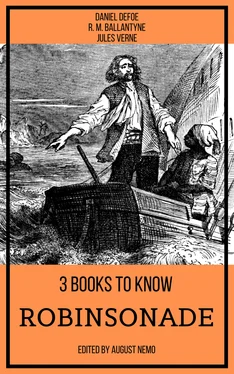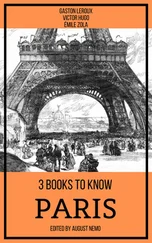Then we advanced to the edge of the rocks — Jack carrying one bundle, with the torch; I the other, with the things for producing fire.
“Now don’t weary for us, Peterkin, should we be gone some time,” said Jack. “We’ll be sure to return in half-an-hour at the very latest, however interesting the cave should be, that we may relieve your mind.”
“Farewell!” said Peterkin, coming up to us with a look of deep but pretended solemnity, while he shook hands and kissed each of us on the cheek —“farewell! And while you are gone I shall repose my weary limbs under the shelter of this bush, and meditate on the changefulness of all things earthly, with special reference to the forsaken condition of a poor shipwrecked sailor-boy!” So saying, Peterkin waved his hand, turned from us, and cast himself upon the ground with a look of melancholy resignation, which was so well feigned that I would have thought it genuine had he not accompanied it with a gentle wink. We both laughed, and springing from the rocks together, plunged head first into the sea.
We gained the interior of the submarine cave without difficulty, and on emerging from the waves, supported ourselves for some time by treading water, while we held the two bundles above our heads. This we did in order to let our eyes become accustomed to the obscurity. Then, when we could see sufficiently, we swam to a shelving rock, and landed in safety. Having wrung the water from our trousers, and dried ourselves as well as we could under the circumstances, we proceeded to ignite the torch. This we accomplished without difficulty in a few minutes; and no sooner did it flare up than we were struck dumb with the wonderful objects that were revealed to our gaze. The roof of the cavern just above us seemed to be about ten feet high, but grew higher as it receded into the distance until it was lost in darkness. It seemed to be made of coral, and was supported by massive columns of the same material. Immense icicles (as they appeared to us) hung from it in various places. These, however, were formed, not of ice, but of a species of limestone, which seemed to flow in a liquid form towards the point of each, where it became solid. A good many drops fell, however, to the rock below, and these formed little cones, which rose to meet the points above. Some of them had already met, and thus we saw how the pillars were formed, which at first seemed to us as if they had been placed there by some human architect to support the roof. As we advanced farther in we saw that the floor was composed of the same material as the pillars, and it presented the curious appearance of ripples such as are formed on water when gently ruffled by the wind. There were several openings on either hand in the walls that seemed to lead into other caverns, but these we did not explore at this time. We also observed that the ceiling was curiously marked in many places, as if it were the fretwork of a noble cathedral; and the walls, as well as the roof, sparkled in the light of our torch, and threw back gleams and flashes as if they were covered with precious stones. Although we proceeded far into this cavern, we did not come to the end of it; and we were obliged to return more speedily than we would otherwise have done, as our torch was nearly expended. We did not observe any openings in the roof, or any indications of places whereby light might enter; but near the entrance to the cavern stood an immense mass of pure-white coral rock, which caught and threw back the little light that found an entrance through the cave’s mouth, and thus produced, we conjectured, the pale-green object which had first attracted our attention. We concluded, also, that the reflecting power of this rock was that which gave forth the dim light that faintly illumined the first part of the cave.
Before diving through the passage again we extinguished the small piece of our torch that remained, and left it in a dry spot — conceiving that we might possibly stand in need of it if, at any future time, we should chance to wet our torch while diving into the cavern. As we stood for a few minutes after it was out, waiting till our eyes became accustomed to the gloom, we could not help remarking the deep, intense stillness and the unutterable gloom of all around us; and as I thought of the stupendous dome above, and the countless gems that had sparkled in the torchlight a few minutes before, it came into my mind to consider how strange it is that God should make such wonderful and exquisitely beautiful works never to be seen at all — except, indeed, by chance visitors such as ourselves.
I afterwards found that there were many such caverns among the islands of the South Seas, some of them larger and more beautiful than the one I have just described.
“Now, Ralph, are you ready?” said Jack in a low voice, that seemed to echo up into the dome above.
“Quite ready.”
“Come along, then,” said he; and plunging off the ledge of the rock into the water, we dived through the narrow entrance. In a few seconds we were panting on the rocks above, and receiving the congratulations of our friend Peterkin.
STRANGE PECULIARITY of the Tides — Also of the Twilight — Peterkin’s Remarkable Conduct in Embracing a Little Pig and Killing a Big Sow — Sage Remarks on Jesting — Also on Love.

IT WAS QUITE A RELIEF to us to breathe the pure air and to enjoy the glad sunshine after our long ramble in the Diamond Cave, as we named it; for although we did not stay more than half-an-hour away, it seemed to us much longer. While we were dressing, and during our walk home, we did our best to satisfy the curiosity of poor Peterkin, who seemed to regret, with lively sincerity, his inability to dive.
There was no help for it, however, so we condoled with him as we best could. Had there been any great rise or fall in the tide of these seas, we might perhaps have found it possible to take him down with us at low water; but as the tide never rose or fell more than eighteen inches or two feet, this was impossible.
This peculiarity of the tide — its slight rise and fall — had not attracted our observation till some time after our residence on the island. Neither had we observed another curious circumstance until we had been some time there. This was the fact that the tide rose and fell with constant regularity, instead of being affected by the changes of the moon as in our own country, and as it is in most other parts of the world — at least, in all those parts with which I am acquainted. Every day and every night, at twelve o’clock precisely, the tide is at the full; and at six o’clock, every morning and evening, it is ebb. I can speak with much confidence on this singular circumstance, as we took particular note of it, and never found it to alter. Of course I must admit we had to guess the hour of twelve midnight, and I think we could do this pretty correctly; but in regard to twelve noon we are quite positive, because we easily found the highest point that the sun reached in the sky by placing ourselves at a certain spot whence we observed the sharp summit of a cliff resting against the sky, just where the sun passed.
Jack and I were surprised that we had not noticed this the first few days of our residence here, and could only account for it by our being so much taken up with the more obvious wonders of our novel situation. I have since learned, however, that this want of observation is a sad and very common infirmity of human nature, there being hundreds of persons before whose eyes the most wonderful things are passing every day who nevertheless, are totally ignorant of them. I therefore have to record my sympathy with such persons, and to recommend to them a course of conduct which I have now for a long time myself adopted — namely, the habit of forcing my attention upon all things that go on around me, and of taking some degree of interest in them whether I feel it naturally or not. I suggest this the more earnestly, though humbly, because I have very frequently come to know that my indifference to a thing has generally been caused by my ignorance in regard to it.
Читать дальше













